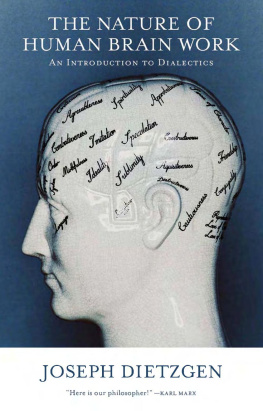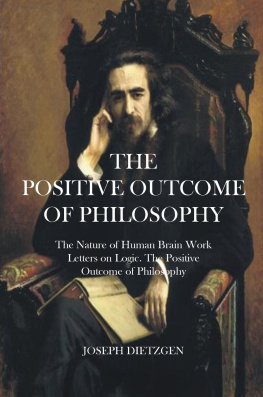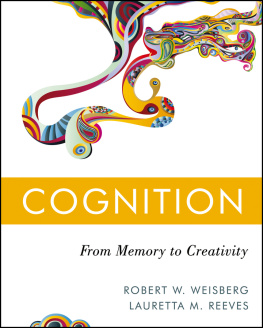Joseph Dietzgen - The Limits of Cognition
Here you can read online Joseph Dietzgen - The Limits of Cognition full text of the book (entire story) in english for free. Download pdf and epub, get meaning, cover and reviews about this ebook. year: 2016, genre: Science. Description of the work, (preface) as well as reviews are available. Best literature library LitArk.com created for fans of good reading and offers a wide selection of genres:
Romance novel
Science fiction
Adventure
Detective
Science
History
Home and family
Prose
Art
Politics
Computer
Non-fiction
Religion
Business
Children
Humor
Choose a favorite category and find really read worthwhile books. Enjoy immersion in the world of imagination, feel the emotions of the characters or learn something new for yourself, make an fascinating discovery.

- Book:The Limits of Cognition
- Author:
- Genre:
- Year:2016
- Rating:5 / 5
- Favourites:Add to favourites
- Your mark:
- 100
- 1
- 2
- 3
- 4
- 5
The Limits of Cognition: summary, description and annotation
We offer to read an annotation, description, summary or preface (depends on what the author of the book "The Limits of Cognition" wrote himself). If you haven't found the necessary information about the book — write in the comments, we will try to find it.
The Limits of Cognition — read online for free the complete book (whole text) full work
Below is the text of the book, divided by pages. System saving the place of the last page read, allows you to conveniently read the book "The Limits of Cognition" online for free, without having to search again every time where you left off. Put a bookmark, and you can go to the page where you finished reading at any time.
Font size:
Interval:
Bookmark:

Source: Joseph Dietzgen, Philosophical Essays, Charles Kerr & Co., Chicago 1906, pp. 224-235;
First published: in Vorwrts, 1877;
Translated: by M. Beer & Th. Rothstein, Edited by Eugene Dietzgen & Joseph Dietzgen Jr.;
Transcribed: by Einde OCallaghan for the Marxists Internet Archive.
Proofread: Andy Carloff, 2010
An anonymous letter touching the above subject, written evidently by an expert, has recently been received by the Vorwrts, which in an unbiased manner attempts to show that Philosophy and Social-Democracy are two things apart and that, therefore, one may very well belong to our party without adhering to the Social-Democratic Philosophy. Hence it is concluded that the central organ of the party was wrong in allowing philosophic discussion to become a party matter.
The editor of the Vorwrts has been good enough to show me that letter as it referred to my articles. Though the author has given clearly to understand that he had no wish to provoke by his protest any public controversy, since, as he maintains, newspaper controversies did not admit of a thorough treatment of the subject, nevertheless I hope he will not find it indiscreet if his objections are used here for the purpose of elucidating a question which both to him and to myself and, to judge from the general interest displayed at present with regard to it, appears to be of great importance to our whole generation. And as regards thoroughness, it seems to me that voluminous books are no better qualified for it than newspaper articles. On the contrary, there has been of late so much long-winded twaddle that a great portion of the public is losing all taste for the discussion of such matters.
First of all I should like to contradict the statement that Philosophy and Social-Democracy were two things apart which had nothing between them in common. Quite true, one may be an efficient member of the party and at the same time a critical philosopher, or even a Christian. The human soul is such a queer thing that it can easily find some sort of conciliation between the veriest contradictions. And not only in things philosophical and religious, but also in things economical, a great measure of heresy is permitted. We must in practice be tolerant to the extreme, and surely no Social-Democrat would ever think of putting any Party member into the straight jacket of uniformity. Nevertheless, theoretical uniformity must be demanded of all who devote them selves to scientific investigation. Theoretical uniformity, systematic homogeneity is the consummation to be desired as well as the advantage of all science. That Social-Democracy is scientific and science is social-democratic will, I hope, be granted by my esteemed opponent. Of course, there are many branches of science which bear less on the socialistic aspirations to emancipate enslaved humanity. But the philosophical question the question whether there is beyond and above the world anything metaphysical, anything higher, which it would be too monstrous for our intellect to attempt to conceive, or which is beyond the human understanding to explain this special question of Philosophy about the Limits of Cognition bears very closely upon the slavery of the people.
Social-Democracy does not seek to establish eternal laws, permanent institutions or unchangeable forms; it seeks in general the salvation of mankind. The indispensable means toward attaining that object is mental enlightenment. The question whether the instrument of cognition is a narrow makeshift, that is an inferior one whether scientific research supplies us with true ideas, with truth in its highest form and last instance, or merely with poor substitutes which have above them the Inconceivable this problem of the Theory of Cognition is eminently a Socialist problem.
All the ruling powers which have exploited the people have to this very day appealed for justification to a higher destiny, to the grace of God, to the holy ointment, to the metaphysical incense. And if they also referred to enlightenment, religious freedom, political progress and critical philosophy, they knew very well that without something higher, something inconceivable, something metaphysical, be it even a mere moral world, the reins will break which keep the people straight and the ruling classes in wealth and dignity.
But let there be no misunderstanding. Not that the Social-Democracy are against the moral world. We, too, desire to arrange the world morally; but we desire this arrangement to emanate from the many below, and not from the few above, that is, we desire to arrange it ourselves. We, therefore, need no chimeras, no limits of cognition to effect and to keep up such an arrangement. It is, on the contrary, preeminently the business of Social-Democracy to make it clear to the perverted world that the individual intellect is a poor instrument in comparison with the fathomless problem of science, so that the individual must circumscribe his efforts within definite limits; but that, on the other hand, the faculty of cognition of the human race is as full of possibilities, as limitless, as fathomless as the problem which nature sets before it for solution. The doctrine of mental poverty, the doctrine of the limited understanding of man is the last remnant of the religious humbug. Those who, on the basis of the Social-Democratic program, strive to emancipate the working class through the workers them elves, must entirely divest themselves of all the foolish expectations and hopes and philosophical hairsplitting and speculation in so far as it all relates to another world.
This other world is now an exploded notion with science and scientific circles; there is only that portion of it left which deals with the limits of cognition, and as long as these are supposed to exist, there is still a higher limitless cognition standing behind, and there is also the Inconceivable, and nobody who has before his eyes that phantom will ever arrive at a proper appreciation of, and confidence in, human energy and responsibility.
To transform radically the present immoral world, an energetic consciousness of the unlimited faculty of cognition of the human mind is required. This makes it imperative that we should place all talk of the possibility of a higher cognition in the same category where the bodies of the Saints stand who, indeed, have stomachs, but need no food, no drink. If another sort of cognition is possible than the one which is commonly called so, then, of course, flesh and blood are possible, too, which look, taste and are constituted like flour and water. In short: we ought, then, to become Catholics, and seek our salvation in prayer and not in active work; we must then give up Social-Democracy.
Our anonymous comrade is of a different opinion. He wants to take up the cudgels in behalf of something inconceivable, in behalf of a limited human cognition, and yet is not willing to stop and keep to those limits. Those who really believe that there is something inconceivable must and will keep away from it with their conception and not try to penetrate further and inquire, else they treat the supernatural as if it were natural, and the inconceivable as if it were merely not yet conceived. An equation like this, our opponent thinks, is merely an external one, the contradiction only a superficial one, since it indicates only that the human mind, which involuntarily affects that equation, is reluctant to admit the existence of the Inconceivable and, therefore, pronounces it merely to be not yet conceived.
If it did do that; if, on the contrary, it were to accept that there really is something inconceivable, which to it is like a sealed book, then under such an acquiescence all incentive towards inquiry would be lost and there would no longer be any science.
Next pageFont size:
Interval:
Bookmark:
Similar books «The Limits of Cognition»
Look at similar books to The Limits of Cognition. We have selected literature similar in name and meaning in the hope of providing readers with more options to find new, interesting, not yet read works.
Discussion, reviews of the book The Limits of Cognition and just readers' own opinions. Leave your comments, write what you think about the work, its meaning or the main characters. Specify what exactly you liked and what you didn't like, and why you think so.



